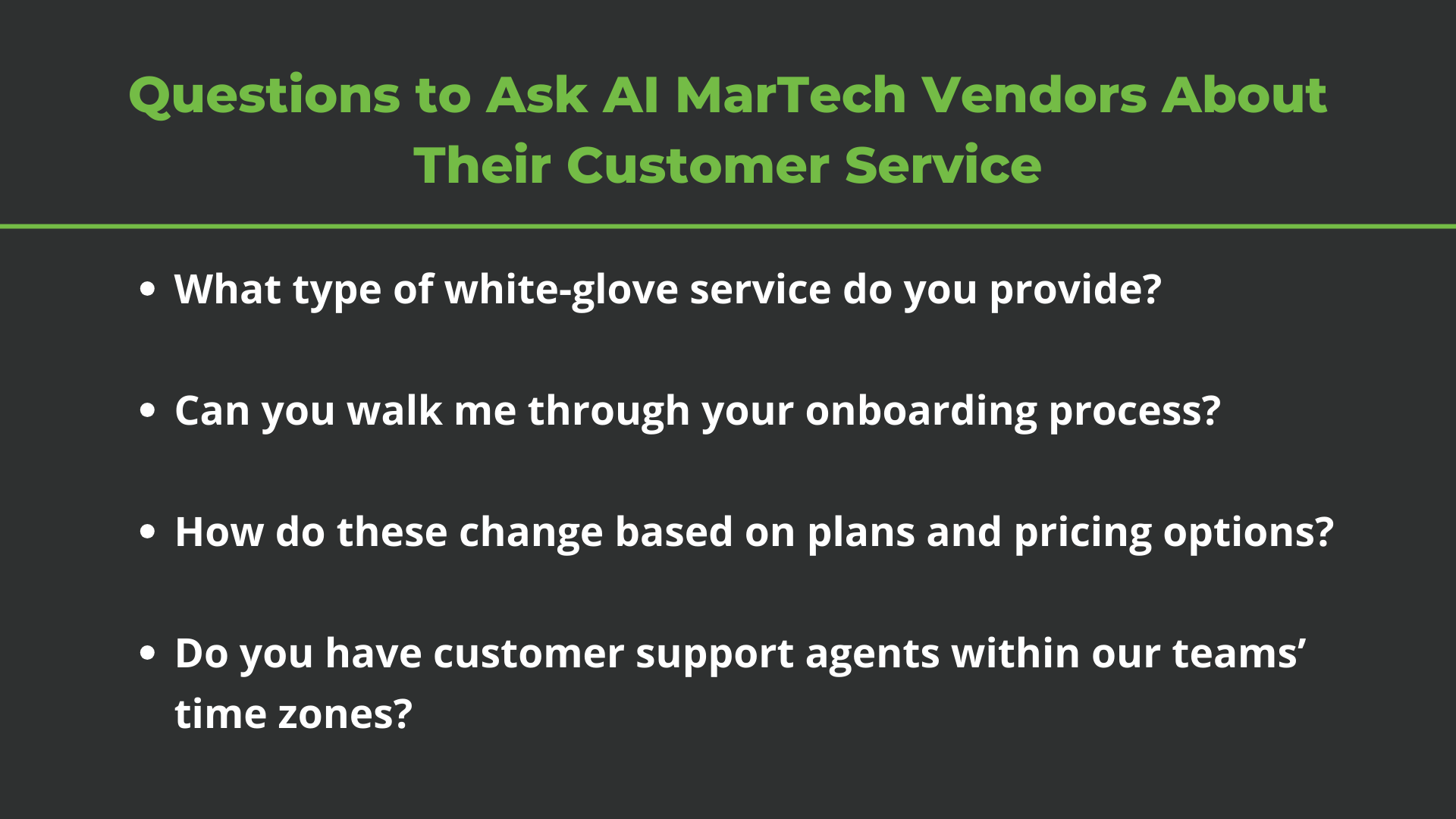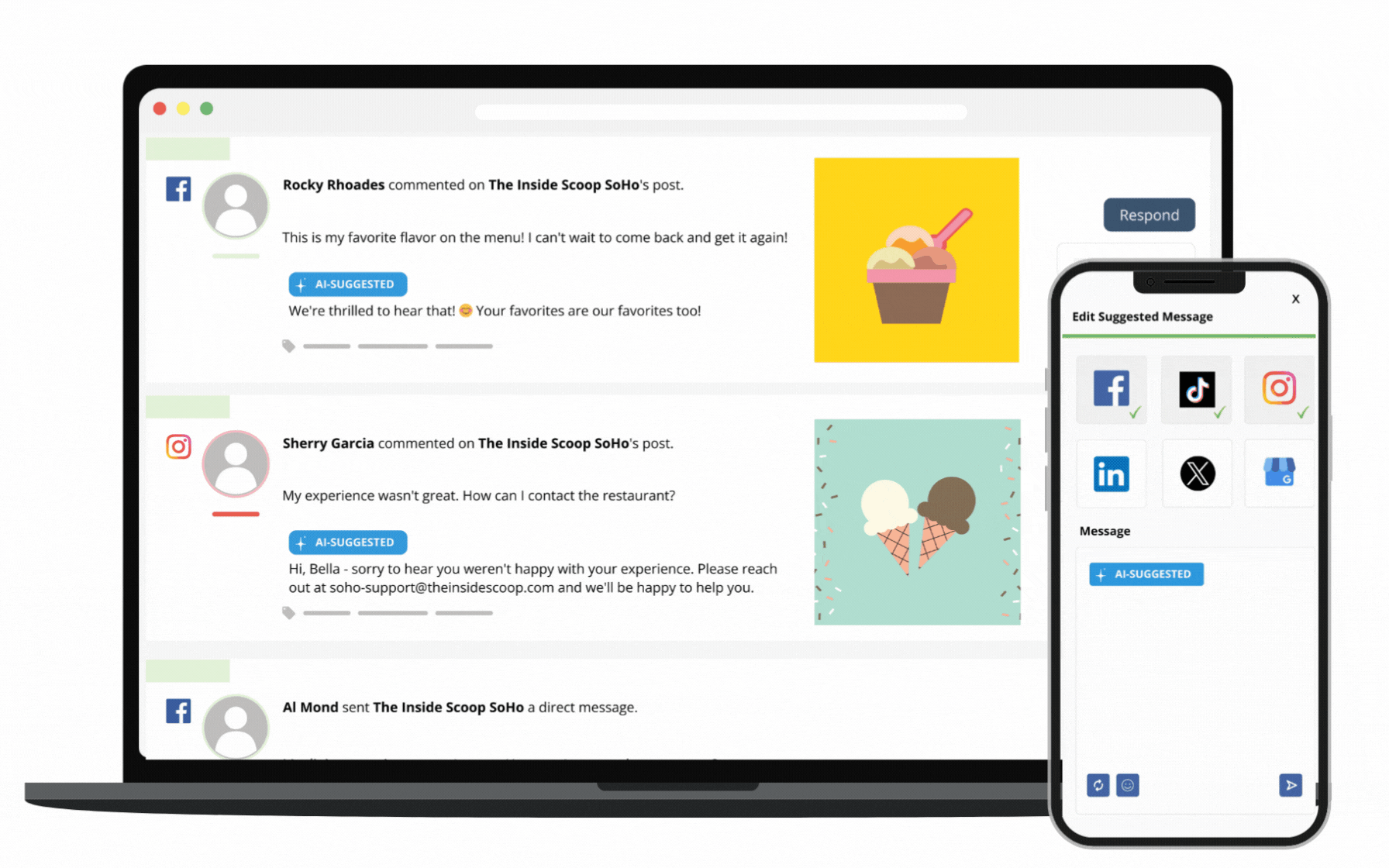Generative Engine Optimization (GEO): Mastering AI-Driven Search in 2025
10 Essential Questions Marketers Should Ask Their AI Vendors
10 Essential Questions Marketers Should Ask Their AI Vendors
The rise of artificial intelligence (AI) is well underway, particularly for businesses and their marketing departments. Our recent survey found that:
- Nearly 7 in 10 marketers believe that marketers leveraging AI will replace those that don’t.
- Almost two-thirds of marketers have incorporated generative AI in their marketing technology (MarTech) stack.
It’s clear that marketing teams are and will continue to invest in AI technology. Surprisingly, though, 70% of multi-location marketers feel inundated by the current pace of AI development and its incorporation into their marketing strategies.
As of July 2023, there are approximately 58,000 AI companies worldwide. With this dichotomy of numerous AI companies to choose from and marketers feeling overwhelmed by AI, you must be confident in selecting and vetting MarTech vendors’ AI capabilities.
In this blog, we’ll go through ten critical questions to ask MarTech vendors about their investment in AI and their technology’s capabilities to help narrow your search and select the best AI MarTech.
1. What Gaps in Our Strategy Does Your Technology Solve?
At the end of the day, you want to know how an AI MarTech can help your marketing team become more efficient, whether it be through better data tracking or generating more click-worthy content.
Learning how software fulfills these gaps and saves your marketers time is one of the most important questions to get answered when selecting AI marketing software. It’s similar to asking an interviewee how their skills can impact the business and solve issues they’re facing.
We recommend asking MarTech companies for case studies and success stories that showcase results to similar paint points you’re experiencing.
2. How Does Your Technology Complement My Current Tech Stack?
When in conversations with MarTech sellers, you want to be upfront about your present tech stack and which technologies you’re using for what. Discuss their shortcomings and issues you face with them.
You can then give the seller time to present a demo and explain how their MarTech differs from your current toolset and how it can complement it.
Sometimes, you may be able to consolidate your efforts into a single solution or two, depending on the software’s offerings. Consolidating your tech stack often leads to cost savings and increased efficiency. We’ll touch more on consolidation later.
3. How Does Your Technology and Its Data Integrate Into Existing Solutions?
Now that you’ve analyzed how a technology fits into your current tech stack, it’s important to look at data integration.
With any MarTech, you want to consider how it integrates with your existing software and data. This holds especially true for AI MarTech because AI software relies heavily on large data sets.
We recommend fostering open communication between your marketing team, IT department, and the MarTech vendor. Schedule meetings to discuss integration requirements, a data migration strategy, and potential challenges other clients have faced that you might as well.
We suggest inquiring about the following:
- API connections and integrations
- If they have existing software development kits (SDKs)
- How the tech handles structured and unstructured data
- Authentication methods
- Request a walk-through of their integration options and requirements
A worthwhile solution should integrate seamlessly with your existing software to break down silos and make it easy to measure your marketing KPIs. If it sounds like more of a burden beyond the upfront onboarding, that solution may not be the right fit for your brand.
4. What Customization Capabilities Do You Offer?
Part of a thorough assessment means examining a company and its technology’s customization capabilities. Here are three ways to best examine customization features:
Software Development Kits (SDKs):
SDKs allow developers to build specific frameworks and easily integrate code into these applications. They save developers significant time they would’ve spent coding or debugging from scratch.
SDKs also give developers an initial understanding of a platform’s flexibility, customization and automation abilities, and how it integrates with other applications.
Equipping your developers with this information ahead of time can help you narrow your AI MarTech vendors.
Pricing Plans:
Customization often depends on which pricing plan you select. So, you should confirm each plan’s customizations and check if they offer individualized plans.
Case Studies:
Ask for and explore case studies or use cases where the vendor had a custom partnership. Look for examples of customized solutions to specific challenges or requirements. These can provide insight into the platform’s adaptability.
5. What Scalability Do You Offer?
Similar to customization capabilities, you also want to consider what scalability potential a vendor offers. For instance, when speaking with different MarTech vendors, ask them for specific information around scalability, such as details on handling increased data volumes, user growth or activity, and expanded functionalities.
Sometimes, it’s best to look backward. You can request concrete data and examples from past clients demonstrating the vendor’s scalability and growth.
Looking to the future, you can also request future roadmaps and how the vendor envisions addressing technological advancements and long-term scalability. As a multi-location brand with numerous business locations, it’s essential to find a solution that supports your efforts at scale.
6. How Are You Handling Data Privacy and Security?

Below are several ways to quell AI data security and privacy fears.
Review Vendors’ Privacy And Security Documentation:
Start by reviewing privacy and security documentation, which is often found on the AI MarTech companies’ websites. Here’s an example of SOCi’s privacy page.

For more detailed information, you can have the vendor share privacy and security documentation in the request for proposal (RFP) or contract. Look for details on encryption methods, access controls, and compliance with data protection regulations.
Confirm Compliance With Regulations
Inquire about the company’s compliance with necessary data protection regulations and laws, such as GDPR, CCPA, and the FTC.
Also, ask about their data handling practices, including using and storing customer information, third-party cookies, and data-sharing exercises.
7. How Do You Ensure AI Accuracy?
AI hallucination occurs when AI makes a mistake and generates false or incorrect information. It’s essential to know beforehand about the types of hallucinations an AI technology produces and how frequently they occur.
To do so, first, inquire about what goes into the AI algorithms. A reputable provider should be able to clearly explain the underlying algorithms, methodologies, and data sources that contribute to generated results. Transparency is key.
You also want to ask about vendors’ data quality. High-quality and diverse datasets help to ensure more accurate results and reduce the risk of hallucinations or biased results.
Lastly, ensure you’re inputting quality data and adequately training your teams. Read our article on preparing for the future of AI to learn how to construct your data and other necessary steps.
8. What Customer Support and Training Do You Offer?
A solid customer service department is the bedrock of any worthwhile MarTech company. After narrowing down your AI MarTech vendors, you should ask each vendor what their customer support and training look like.
Proper learning and training are often needed to master these AI technologies. We recommend looking into the following:

Knowing these questions can help further narrow down your list of AI MarTech software.
9. What Are Your Future Plans With AI?
AI technology is proliferating. You want to ensure any MarTech vendor you work with keeps their technology up to date and is a leader in their field.
If they’re a private company, this means ensuring they’re well-funded and have a lengthy runway. If public, you can listen to quarterly earnings calls and look at their stock prices over time.
Furthermore, you should inquire about current customer complaints and issues. What are they doing to resolve these issues? How quickly are they resolving them?
Lastly, ask companies how they’re keeping up with the future of AI and which future integrations or software updates they plan to roll out in the upcoming quarters and years.
10. What Partnerships With AI Innovators Do You Have?
Speaking of future integrations, you also want to inquire about current partnerships. Do these software companies partner with AI innovators like OpenAI, IBM, Google, AWS, and others?
If so, you want to discover how these partnerships work. To do so, request details on the nature and extent of these collaborations. More often than not, MarTech companies are happy to disclose and highlight their partnerships, particularly with note-worthy AI players.
For more details, we also recommend reviewing any vendor’s product documentation that mentions product integrations and partnerships.
Selecting an AI MarTech Solution for Your Multi-Location Brand
Selecting the right AI MarTech solutions is a critical decision that requires careful consideration and research.
If you’re a multi-location enterprise or franchise company, it’s crucial to choose a solution that has AI capabilities in all three major phases of localized marketing — local search, local social, and online reputation management.
That’s where SOCi comes in! SOCi is the CoMarketing Cloud for multi-location enterprises. Our AI automation layer, SOCi Genius, leverages advanced data science and best-in-class generative AI to function as a data scientist and marketer for each location.
Our Genius Reviews solution uses AI to generate on-brand responses to online reviews and ratings in seconds. Moreover, our recently released Genius Social allows you to interact with social media engagements and generate highly engaging and location-specific content.

With a robust approach to data privacy and security, a focus on AI accuracy, and a dedication to customer support and training, SOCi exemplifies the qualities of an experienced and authentic partner.
Request a demo today to learn more about SOCi Genius and how our AI capabilities can support your multi-location brand!





